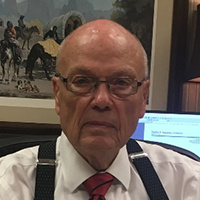Toronto Juvenile Law Lawyer, Kansas
Not enough matches for Toronto Juvenile Law lawyer.
Below are all Toronto lawyers.
Stanley R. Ausemus
✓ VERIFIEDAccident & Injury, DUI-DWI, Criminal, Bankruptcy & Debt, Divorce & Family Law
Here at the law offices of Stanley R. Ausemus, Chartered, my mission is to provide quality legal support and counsel to my clients. I have a reputatio... (more)
Thomas P. Mikulka
Real Estate, Government, Divorce & Family Law, Criminal
Status: In Good Standing Licensed: 43 Years
John K. Chenoweth
Real Estate, Government, Estate, Bankruptcy & Debt
Status: In Good Standing Licensed: 43 Years


